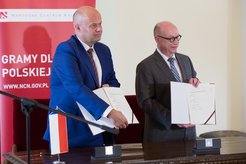New deal to boost excellent research in Eastern Europe
Max Planck Society launches programme to reinforce cutting-edge research in Central and Eastern Europe / Until 2021, an initial funding of over ten million euros is provided for researchers at the initiative's debut in Poland.
Through the innovative format of the new Dioscuri Centres of Scientific Excellence, the Max Planck Society plans to promote the development and expansion of scientific excellence in Central and Eastern Europe. In a first step, the person-centred funding programme is initially established in Poland. Max Planck President Martin Stratmann signed a cooperation agreement to that effect on July 4 with Zbigniew Błocki, director of the Polish government agency National Science Centre (NCN). The meeting was also attended by Polish Vice-Premier and Minister of Science and Higher Education Jarosław Gowin as well as Volker Rieke, Director General for European and International Cooperation at the Federal Ministry of Education and Research. The German and Polish governments are mutually responsible for financing.

The first call for applications to establish Dioscuri Centres in Poland is to take place in autumn. A scientific committee made up of internationally renowned researchers will be responsible for selecting the researchers (Principal Investigators) who will lead each centre in accordance with the Max Planck Society's proven strategies for safeguarding excellence, which have been in place for several decades. Max Planck President Martin Stratmann explained why Dioscuri can create recognisable added value for the European Research Area: "The gold standard for the promotion of research in Europe is based on excellence-based competition for the best ideas. In the future, to ensure that not only applications above all from the traditionally established countries in western and northern Europe are successful, we want to improve the perspectives for well-established scientists in Eastern Europe with additional funds as well as a network of international cutting-edge scientists.”
Dioscuri Centres will be established in regions where appropriate foundations have already been laid thanks to the established infrastructure, and where an environment for cutting-edge research exists. They should attract outstanding scientists, thus becoming true levers of excellence in research in Central and Eastern Europe.
Each Dioscuri Centre will be provided with 300,000 euros per year; this amount is financed in equal proportions by the German Federal Ministry of Education and Research and by the Polish government. The first call for applications is expected to fill up to three Dioscuri Centres. They can be established at both Polish universities as well as non-university institutions; positions are to be funded for five years and can be extended a further five years following successful evaluation by external experts.
The focal point of each Dioscuri Centre is a Principal Investigator, who can use the programme budget to establish an internationally competitive group of researchers. The host institution in Poland will provide the infrastructure, such as laboratory rooms and equipment. The plan is to establish successively up to ten Dioscuri Centres in Poland. Another essential component of the programme is close cooperation with mentors in Germany. This is intended both to strengthen scientific cooperation between Poland and Germany and also to consolidate the international network of the Centres. The Dioscuri programme itself will also be evaluated after five years. It is designed in such a way as to develop up to twenty Dioscuri Centres over the entire region, following possible expansion to other countries in central and Eastern Europe.












